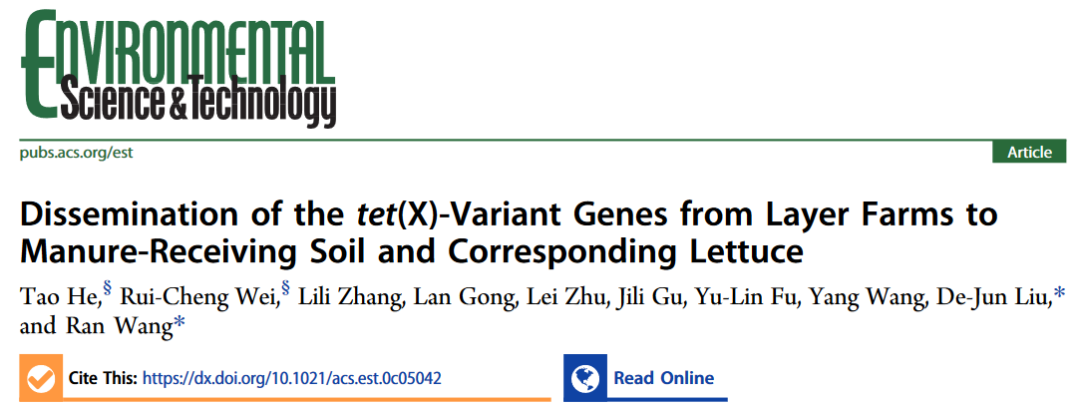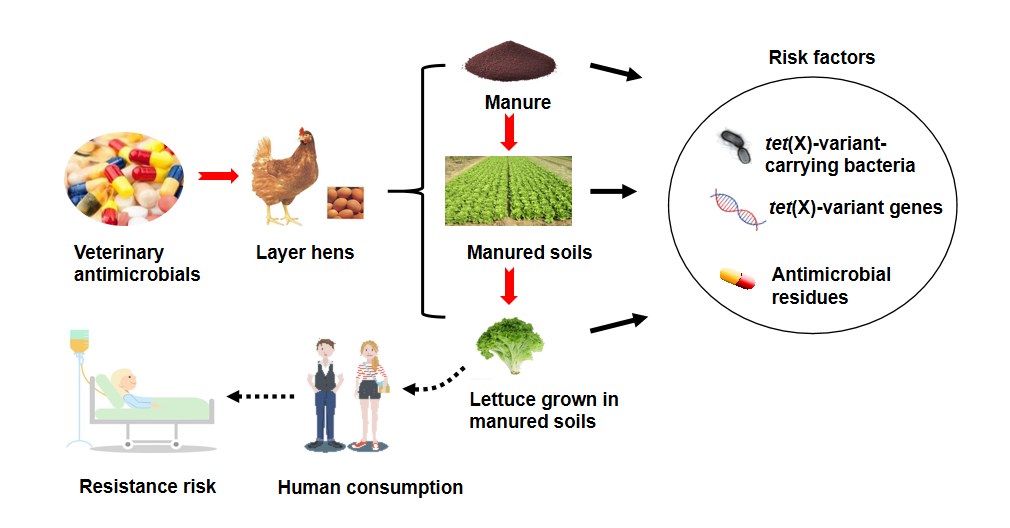Recently, Professor Ran Wang’s group from JAAS has published their novel findings about the assessment of the high-level tigecycline resistance genes along the agri-product-producing chain, in the journal of Environmental Science & Technology(IF=7.864). Dr. Tao He and Dr. Ruicheng Wei were the first co-authors of this research article, and Professor Ran Wang and Dr. Dejunliu were the corresponding authors.

Tigecycline is thought to be the last-resort antibiotic in human clinic and the occurrence of high-level tigecycline resistance tet(X) variant genes represent a new transferable resistance crisis to food safety and human health. Here Wang’s group investigated the abundance of tet(X)-variant genes (tet(X), tet(X1) to tet(X6)) in 33 samples collected from layer manures, manured/un-manured soils and corresponding lettuce from three provinces in China. The results showed the occurrence of tet(X)/(X2), tet(X3) and tet(X4) in 24 samples. The detection rate of tet(X)/(X2) (23/24) is higher than that of tet(X3) (7/24) and tet(X4) (2/24), and tet(X)/tet(X2) and tet(X3) were found to be enriched and more abundant in most manured soil and several lettuce samples from manured soils than that from manure samples. 26 tigecycline resistant bacteria were isolated, and tet(X)-variant genes were found to be disseminated not only by bacterial clone spread, but also via multidrug resistance plasmids. The total concentrations of tet(X)-variant genes showed significantly positive correlations (R = 0.683, p < 0.001) with ISCR2. Two veterinary tetracyclines (tetracycline and oxytetracycline) and other classes of antimicrobials (enrofloxacin, azithromycin, thiamphenicol and florfenicol) showed significant correlations with the total concentrations of tet(X)-variant genes (R=0.35-0.516, p<0.05). The findings indicate the transmission of tet(X)-variant genes from layer manures to their receiving environmental soils and lettuce and highlight the contribution of veterinary antimicrobials to the spread of tet(X)-variant genes.
As many antimicrobials (especially the veterinary tetracyclines) could contribute to the spread of tet(X)-variant genes as indicated in this study, effective measures should be conducted to mitigate the dissemination of tet(X)-variants from the antimicrobial usage perspective in layer farms in the future. Fortunately, the Chinese Ministry of Agriculture and Rural Affairs has issued Announcement No. 194 on July 4, 2019, which states to withdraw all growth-promoting drug feed additives except Chinese medicine from January 1, 2020. Therefore, continued monitoring is recommended to assess the effect of the drug-banning policy in animal husbandry to the possible mitigation of ARGs including the tet(X)-variant genes.



